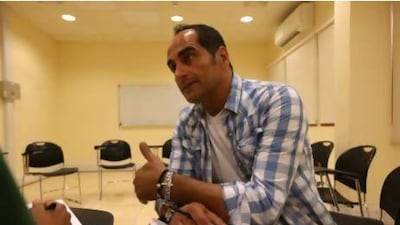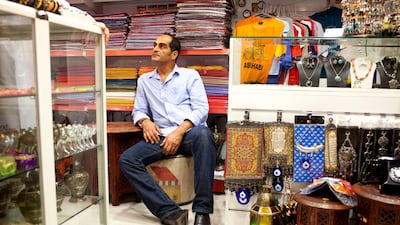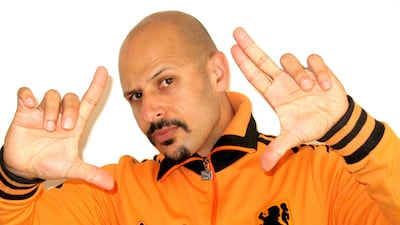As young women and men flood the streets of cities across Iran in the biggest popular protest movement since 2009, prominent Iranian Americans are speaking out in support of the demonstrators.
The death of Mahsa Amini while in the custody of Iran's morality police has sparked more than a month of protests that have galvanised Iranians and others around the world. The 22-year-old woman died after being detained for allegedly not wearing her hijab in accordance with the country's strict standards.
“Apparently her appearance wasn't right. So they took her to the prison to re-educate her … She was beaten and she landed in a coma and she died,” Narges Rashidi, an American-German actress who was born in Iran, told The National.
“That is just beyond saddening. I don't know what else to say. I'm speechless and I really, really hope that one day this will stop.”
Following Amini's death, protesters chanted “jin, jiyan, azadi”, which translates to “woman, life, freedom”. It has become a rallying cry for demonstrators worldwide.
The movement has inspired many prominent Iranian-American figures and celebrities to speak out against the government of their ancestral homeland, which is ruled by a religious authority overseen by the supreme leader Ayatollah Ali Khamenei.
For many, Amini's death triggered long-buried memories of personal run-ins with the morality police or stories of relatives who have suffered under the regime.
Shirin Behzadi, an Iranian-American businesswomen, recalled being only 15 in Iran when soldiers stopped her and a friend.
“These soldiers stopped us, which they did randomly all the time, separated us, asked us questions. Where we were going? Where we were? Then blindfolded us, put us in a jeep with a bunch of guys with machine guns so we had no idea where we were being taken,” Ms Behzadi told The National.
Ms Behzadi said she was strip searched and held for several hours before being released. The encounter was one of many she had with authorities.
The businesswoman, who fled the country when she was 17, said: “It's really time to speak up for those risking their lives in Iran.”
Yeganeh Rezaian, a senior researcher at the Committee to Protect Journalists, described what is happening as a “women-led revolution” that began as a protest against “40 years of gender apartheid”.
Iran no stranger to protests
During the Green Movement of 2009, hundreds of thousands of people rallied in Iran against what they said was the rigged election of Mahmoud Ahmadinejad. In 2019, demonstrators protested across the country, demanding the removal of leaders as petrol prices soared.
But experts say the current movement, now in its second month, feels different and has been embraced by a broader section of Iranian society.
The group Human Rights Activists in Iran reported that at least 233 people have been killed by security forces since the demonstrations began on September 16.
The UN estimates that 23 children have been killed and has called on Iran to “stop all violence against children”.
The movement has triggered a wave of social media hashtags and support.
Actress Sarah Shahi took to Instagram using the hashtag #MahsaAmini to urge world leaders to do something.
“Anyone know how to get a meeting with world leaders?” she asked. “Maybe we can arm wrestle them for change.”
Shahi, who was born in the US to Iranian parents, expressed her love and appreciation for Iranian culture and history, but said she had heard “stories of the tyranny in Iran” since she was young.
The actress, who stars in the recently released superhero film Black Adam, said she felt compelled to speak out for her female relatives.
“I’m going to be the voice of my mother, my mother’s mother and so on,” she wrote in the post.
“I don’t know how much impact it’ll have, I’m not really sure where to start, I’m not exactly sure how to inspire change in this situation. But I’d be disrespecting everything my mother stood for if I didn’t. I stand as one, but I come as many.”
Yara Shahidi, who starred in the popular TV series Black-ish and is currently in the offshoot Grown-ish, has repeatedly referenced the protests through her Instagram account, where she has more than seven million followers.
The actress, whose father is Iranian, recently called attention to the fire in Evin prison, where Iranian authorities say eight people died after an altercation at a sewing workshop. She has also shared video explainers on the movement.
Navid Negahban, who appeared in the popular series Homeland and played the sultan in the 2019 live action version of Aladdin, has posted dozens of times since the start of the movement.
Negahban, who was born in Iran, has posted in both Farsi and English on social media about the protests.
“Women’s rights are human rights,” he posted on October 6. “From Germany to Canada, from Sweden to Chile: we stand with the brave women and men of Iran.”
Maz Jobrani, an Iranian-American comedian, recently posted a video on Instagram imploring people to care about what is happening in Iran.
“The country has been mismanaged and these people are in the streets right now fighting for their freedom, for their rights but mostly for democracy,” he said. “They need our support.”
Prominent Iranian Americans often speak out against the regime but these demonstrations seem to have inspired an unusual level of support.
“This time around, it has been on an even bigger scale, because the movement has been longer and the longer it takes, the more people have come out to declare solidarity,” said Arash Azizi, a historian at New York University, who published a book on the former head of Iran’s Islamic Revolutionary Guard Corps, Maj Gen Qassem Suleimani.
At this point in the movement, these prominent figures are helping to keep a conversation going on what is transpiring in Iran and that, Mr Azizi said, is desperately needed.
“It's important because it raises awareness,” he said.
With additional reporting by Chris Newbould





















































































